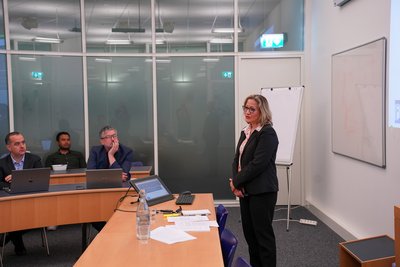19 May 2025
Advancing Environmental Justice Through Trade?
Drawing from her experiences in comparative literature studies and her childhood in the Panamanian cloud forests, Prof. Trujillo highlighted the enduring link among trade,sustainability, and community engagement with social policy making. Her current research focuses on sustainable governance, supply chains, and consumer behavior within the context of evolving trade frameworks.
The WTI recently welcomed Prof. Dr. Elizabeth Trujillo, a distinguished legal scholar, for a Brown Bag Seminar to explore how regional trade agreements can serve as vehicles for preserving environmental justice. As the Mary Ann & Lawrence E. Faust Professor of Law and Founding Director of the Initiative on Global Law and Policy for the Americas, Prof. Trujillo brings a unique interdisciplinary perspective—blending energy and environmental law, trade law and policy analysis.
Drawing from her experiences in comparative literature studies and her childhood in the Panamanian cloud forests, Prof. Trujillo highlighted the enduring link among trade,sustainability, and community engagement with social policy making. Her current research focuses on sustainable governance, supply chains, and consumer behavior within the context of evolving trade frameworks.
Central to the discussion was the concept of democratic social bargaining, where trade agreements—particularly regional ones like USMCA—serve not just economic ends, but also to protect environmental and labor values. Prof. Trujillo argued that such agreements can act as buffers against political instability, preserving long-term environmental commitments even amid administrative rollbacks, such as seen in the current push against climate change mitigation policies.
A case study on Mexico’s avocado industry illustrated the real-world environmental consequences of trade, including deforestation and water scarcity, linking these challenges with environmental justice concerns of local communities impacted by expanding supply chains. Similar challenges are relevant for other primary resources needed in the modern technological revolution. Mechanisms like citizen submissions and transparency tools within USMCA were cited as some essential tools for local public engagement and accountability in trade governance. A growing trend, also in the EU, is ths use of more direct remedial action for environmental violations such as tariffs and penalties, which can have coercive effects on developing countries.
The seminar emphasized the need for:
- More empirical research into the impact of environmental tariffs and trade-linked environmental policies.
- Regional coalitions to amplify sustainable development efforts and embedded environmental justice in future trade agreements.
Prof. Trujillo’s insights reaffirmed the potential of trade law as an avenue to pursue environmental justice, opening up the possibility to reimagine trade not merely as economic policy–but as a platform for inclusive, sustainable governance.


